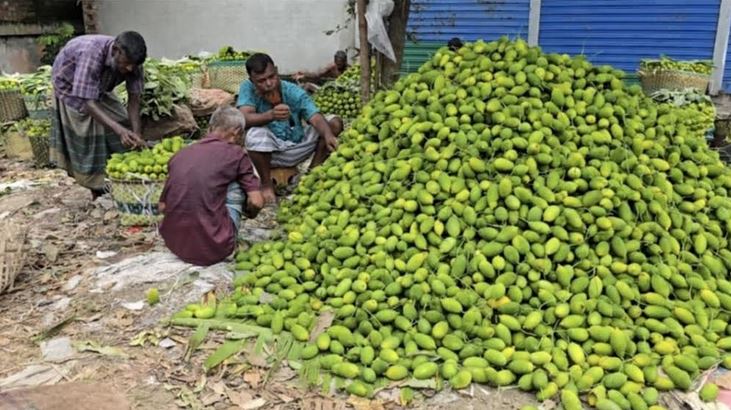News Flash
News Flash

NARSINGDI, Oct 01, 2025 (BSS) - Narsingdi, long known as the district of vegetables, is gaining international attention for its production and export of kakrol (spiny gourd), a popular summer vegetable.
Once limited to local markets, Narsingdi's 'kakrol' is now being exported to Europe and the Middle East, attracting health-conscious consumers and expatriate Bangladeshis with its larger size, attractive appearance and superior taste.
Baroicha Bazar in Belabo upazila has become a bustling center for kakrol trade.
During the season, tonnes of the vegetable arrive daily, with laborers sorting by size and packing them into baskets, sacks, and crates. Farmers say daily transactions run into crores of taka, boosting the local economy.
Among Narsingdi's six upazilas, Shibpur and Belabo lead in kakrol production. Harvests are transported from villages to the bazar, then supplied to Dhaka and other major cities, benefiting farmers, wholesalers and retailers alike.
Local traders also export kakrol regularly, though rising air freight costs have slowed shipments in recent times. Still, international demand continues to grow.
In the wholesale market, kakrol sells for Tk 40-45 per kg depending on size, while farmers earn direct income at the bazar.
According to the Department of Agricultural Extension (DAE) in Narsingdi, 28,478 metric tonnes of kakrol were produced this year on 1,485 hectares, with about 100 metric tonnes exported.
Officials said initiatives such as providing modern technology, fertilizers, and quality seeds are underway to boost production further.
Farmers report strong profits despite rising costs. Abdul Kader, 45, of Shibpur's Sabuj Pahar said, "Kakrol cultivation requires low investment but yields high returns. I invested Tk 80,000 on 20% of my land and earned Tk 2.2 lakh, expecting another Tk 35,000-40,000 from the remaining crop."
Fatema Begum, 38, from Binnabaid in Belabo added, "I cultivated kakrol on 32 decimals of land while managing my household. The income supports my family and children's education."
Shahidullah Bhuiyan, 55, noted that although fertilizer and labor costs have risen, kakrol farming remains profitable.
Abul Hasan, owner of Hasan Arat in Baroicha Bazar, said, "Wholesalers from various districts buy kakrol here at Tk 35-45 per kg, depending on size and quality."
Local farmers believe Narsingdi's success demonstrates that with proper planning and government support, Bangladesh's vegetable sector could become a significant source of foreign exchange.
Muhammad Abdul Hai, acting deputy director of the DAE in Narsingdi, said, "We are working to ensure farmers' vegetables reach both local and international markets. Kakrol is no longer just a local crop, with commitment to quality and pesticide-free cultivation, it can contribute substantially to the national economy."